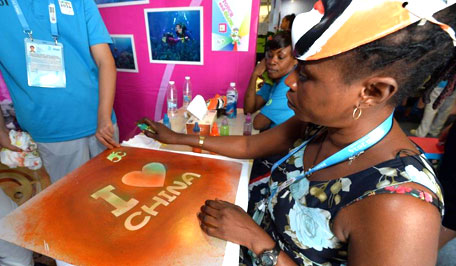Learning and sharing at the Youth Olympic Village

 0 Comment(s)
0 Comment(s) Print
Print E-mail CNTV, August 25, 2014
E-mail CNTV, August 25, 2014
The Youth Olympic Games in Nanjing, which unlike the Olympic Games that focus on results and competition, are more about learning and sharing. At the Youth Olympic Village where the athletes live, they can learn about each others' cultures, as well as share their emotions.
The Youth Olympic Village is just like a small world of 140,000 square meters. In it are more than 5,900 athletes, team officials and journalists from more than 200 countries and regions. Here, athletes can rest in their dormitories and also relax with music and massages.
"There's a lot of things going on, and then at some point in time, you want just sit down, and you want to relax. You'll be able to not worry about anything. So I think this is a great opportunity, just to sit down and relax." said Brandee Johnson, American Athlete.
"We have about 200 clients every day. Most of them are veteran customers. Maybe one came here by himself the first time and then went back to tell all of his delegation and bring them together the other day." said Shao Gang, Supervisor, Music for Stress Relief.
Athletes can also have fun and learn about other countries' culture by trying something new here at the world culture village, where they can enjoy dance performances, play an African drum, or try to spin a Chinese top.
"It's not difficult, I just want to try, it's a new experience. It looks interesting, for kids, especially." said Kliton Muca, Chef de Mission, Albania.
"For Africa, it's interesting, because we know nothing for this, now we learn a lot for Africa." said Betina Temelkova, Bulgarian Athlete.
There are more than 50 displays depicting each participating African country's culture. One African participant even tried to attract people by performing traditional dances and drumming.
"I came here, it's like the Gambian stall was a bit too dull. So I just wanted to liven it up a bit. That's all, just some fun." said Mary P.P. Decker, Chef de Mission, Gambia.
Of course, one of the most popular culture centers in the village is the China house. Athletes can listen to traditional Chinese music, paint Chinese opera masks and even learn to write their names in Chinese.
"Unfortunately I don't know any signs, because you know it's not easy for us. We're trying to understand something, we're trying to read your language. It's not easy for European guys, but it's so funny to us with this name, because normally it takes five letters to write my name, I see it's three letters here." said Kamil Adrian Majchrzak, Polish Athlete.
This world culture village is a unique part of the Youth Olympic Games. The China house will remain throughout the games, while the other 50 will change their displays by continent every four days, with items from Europe, Africa, Oceania, the Americas, and Asia.





